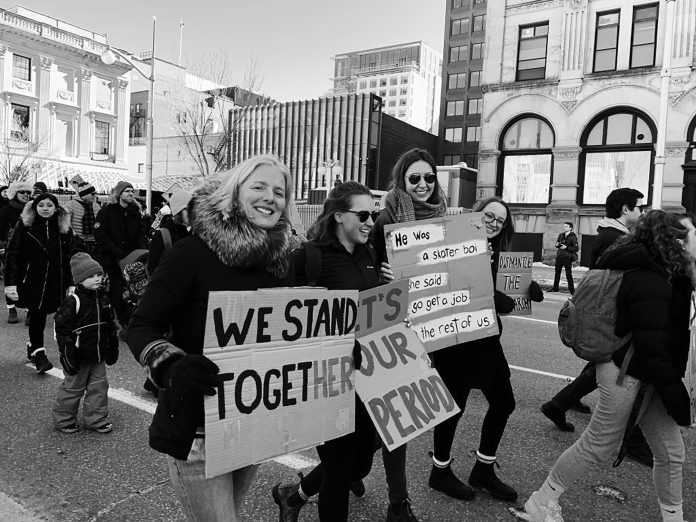By Maureen McEwan
On March 8, International Women’s Day (IWD) celebrates its 110th anniversary.
The day recognizes the political, cultural, economic and social achievements of women and advocates for gender parity globally.
IWD was first observed on March 19, 1911 in Europe, growing out of labour movements in both Europe and North America, according to Women and Gender Equality Canada. Decades later, the United Nations designated March 8 as IWD.
Ahead of IWD 2021, Kitchissippi Times reached out to Catherina McKenna, minister of infrastructure and communities and member of Parliament (MP) for Ottawa Centre. The MP took time to answer questions via email about IWD and what the day means to her.
Q: Why is it important for Canadians (and Ottawa Centre residents) to celebrate International Women’s Day
(March 8)?
A: There are so many reasons why it’s important to celebrate International Women’s Day. While we have made progress, we still have so much work to do to achieve gender parity. I really like this year’s theme “Choose to Challenge.” We need to challenge stereotypes and gender biases.
Women are powerful and make change, women are engaged in their communities and women are leading the way towards a more prosperous and inclusive future. Look at Malala, who changed the world through her story, fighting for an education that so many of us take for granted. Or Greta Thunberg who is challenging world leaders in the fight against climate change. Right here in Ottawa, we have an incredible woman who is guiding Ottawa through this pandemic: Dr. Vera Etches!
It’s so important that we keep highlighting the amazing achievements women have made and continue to make every day.
Q: What does International Women’s Day mean to you?
A: I’ll tell you why this day is so important to me. I have three kids: one boy and two daughters. Before I was elected, I took my younger daughter to see Question Period in Parliament. She’s a pretty observant kid. She looked down at the House of Commons, and asked me, “Why are there so many men?”
That really hit me. But I was also proud that she asked the question. It means that she sees the problem: That’s a good place to start. At the same time, I don’t want my grandchildren asking the same questions. That’s one of the reasons why I got into politics.
We’ve made progress in achieving a gender-balanced cabinet, and governments around the world are inspired by [this step] which is great. We know that diverse cabinets — just like diverse boards, and we’re like a board — make better decisions. So having so many women really enhances our decision making ability and leads to more nuanced discussions.
But we still don’t have enough women in parliament by a long shot. I think I can speak for all of us — including for my male colleagues — that we got into politics to make Canada, and the world, a better place, and that includes a more inclusive world, with more women at the table.
Q: Women and Gender Equality Canada describes March 8 as “a global day of recognition celebrating the social, economic, cultural and political achievements of women and girls, and raising awareness of the work left to be done.” In your opinion, what work is left to be done in Canadian politics to achieve gender equality?
A: Progress to elect more women at all levels of government in Canada remains slow, especially for women of colour and Indigenous women. Federally, 98 women were elected as members of Parliament in the federal election, which represents 29 per cent of the 338 members in the Commons.
How do we increase these numbers and one day achieve parity? We need more women to run — and we need more women to win — in federal, provincial and local politics. We need these women across all party lines, and we need women from a diversity of backgrounds.
Why is this so important? There are so many issues in which women are disproportionately or differently impacted. And it is for this reason that policies need to be understood by all angles: how they impact women. We can do this through more representation of women in government.
When my daughters are grown up, I want them to inherit a world of possibility. I want them to know they can solve any problem if they ask the right questions, challenge traditional thinking and take risks.
Q: How are you celebrating the day this year?
A: With this year’s theme being #ChooseToChallenge, I am challenging girls and women to run. Run as a school board trustee, run for your school president, run for council [municipally] or [run] federally. Whatever it is, get inspired and motivated to throw your hat in the ring.
Q: Would you like to add anything else on the subject?
A: You may have heard me say “run like a girl” since entering politics. There’s a story behind this that has really motivated me to encourage girls and women to run in politics. When I was in grade school, I remember playing soccer with the boys. I could compete with the best of them and one boy didn’t like that. “You run like a girl,” he told me. After decades competing in sports, business and politics at the highest levels, I can tell you this: You can run like a girl, you should run like a girl and you can win like a girl. You can do it even when the odds are stacked against you.
When women and girls have the opportunities and resources to succeed, it enriches all of society. We are all stronger when women and girls are empowered!
To learn more, visit internationalwomensday.com.
